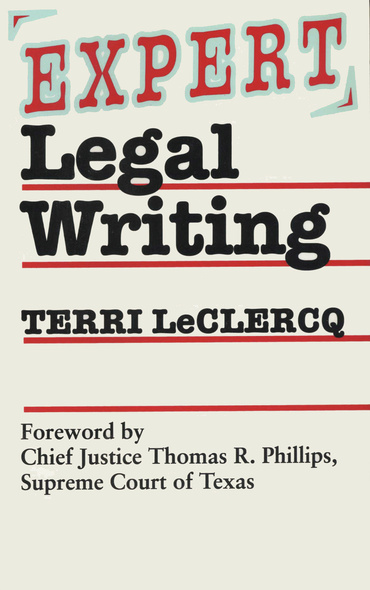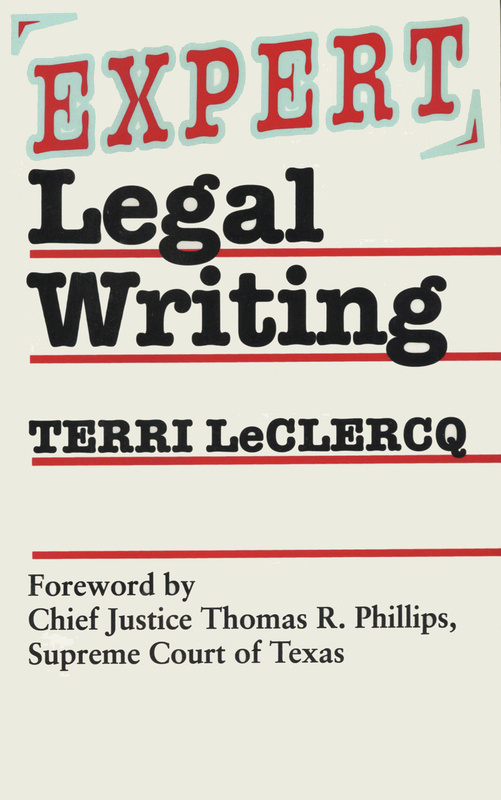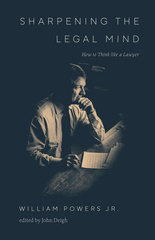Expert Legal Writing
By Terri LeClercq; Introduction by Thomas R. Phillips
University of Texas Press
For many years, Terri LeClercq's "Legal Writing" column in the Texas Bar Journal helped polish the prose of lawyers and law students, judges and clerks, paralegals, writing instructors, and legal secretaries. This book collects all the advice she has given in her columns into one authoritative guide for expert legal writing. LeClercq covers everything a legal writer needs to know, from the mechanics of grammar and punctuation to the finer points of style, organization, and clarity of meaning. With her practical, readable, and often humorous advice, those who prepare legal documents can rid their prose of mind-numbing "legalese" and write with the clarity and precision that characterize the very best legal writing.
LeClercq can be read generally for an education or consulted specifically for an answer. In either case, her short and readable articles are practical aids to maintaining your intelligibility and, frankly, your credibility.
Drop what you’re doing and get a copy of Terri LeClercq’s book. Read it, absorb it, and use it daily. Your writing and your thinking will improve. Ms. LeClercq will rid you of the dense, hidebound jargon you were taught in law school, and introduce you to the wonderful world of clarity and brevity.
Dr. Terri LeClercq taught advanced legal writing at the University of Texas School of Law for twenty-two years.
- Foreword by Chief Justice Thomas R. Phillip
- Acknowledgments
- Part I. Introduction: Getting and Keeping a Competitive Edge
- Introduction
- 1. Writing like a Lawyer
- 2. Writing's a Touchy Subject
- 3. Focus on Density
- 4. Attorneys and Writer's Block
- 5. Min(d)ing the Field: Appellate Judges Speak Out
- Part II. Manipulating Legal Sentences: First Aid
- 6. The Long Sentence
- 7. Left-Handed Sentences
- 8. Marshmallow Constructions
- 9. Cases and Citations Within the Text
- 10. Coordination and Subordination: Defining Relationships
- 11. Examining Other Professional Prose
- 12. Emulating the Pro's Prose: Stylistic Consciousness
- 13. Deliberate Sentence Structure
- 14. Beware of Ambiguous Modifiers
- Part III. Manipulating Legal Organization: Structure Is Meaning
- 15. Organization and the Deductive Thrust
- 16. Organizational Advice for Successful Drafting
- 17. Quick Tricks for Organization
- Part IV. Manipulating Words: Bigger Isn't Better
- 18. Jargon: Manure, Margarine, and Moderation
- 19. Boilerplate: Empty Formalisms
- 20. Gender-Neutral Language
- 21. That's Not What I Meant
- Part V. Punctuating for Clarity: The Poetry of Punctuation
- 22. Allowing Commas to Create Meaning
- 23. Sentence Punctuation Guide
- 24. "Quotation Marks?" She Queried—or, The Arbitrary Rules Surrounding Quotation Marks
- 25. That Sophisticated Semicolon
- 26. Compound Adjectives and Noun Strings
- Part VI. Advice and References: So Go Be an Expert
- 27. Testing Your Basics
- 28. Grammar Rules Versus Suggestions
- 29. Advice to Partners About Advice
- 30. Reference Books for Legal Writers
- Index






